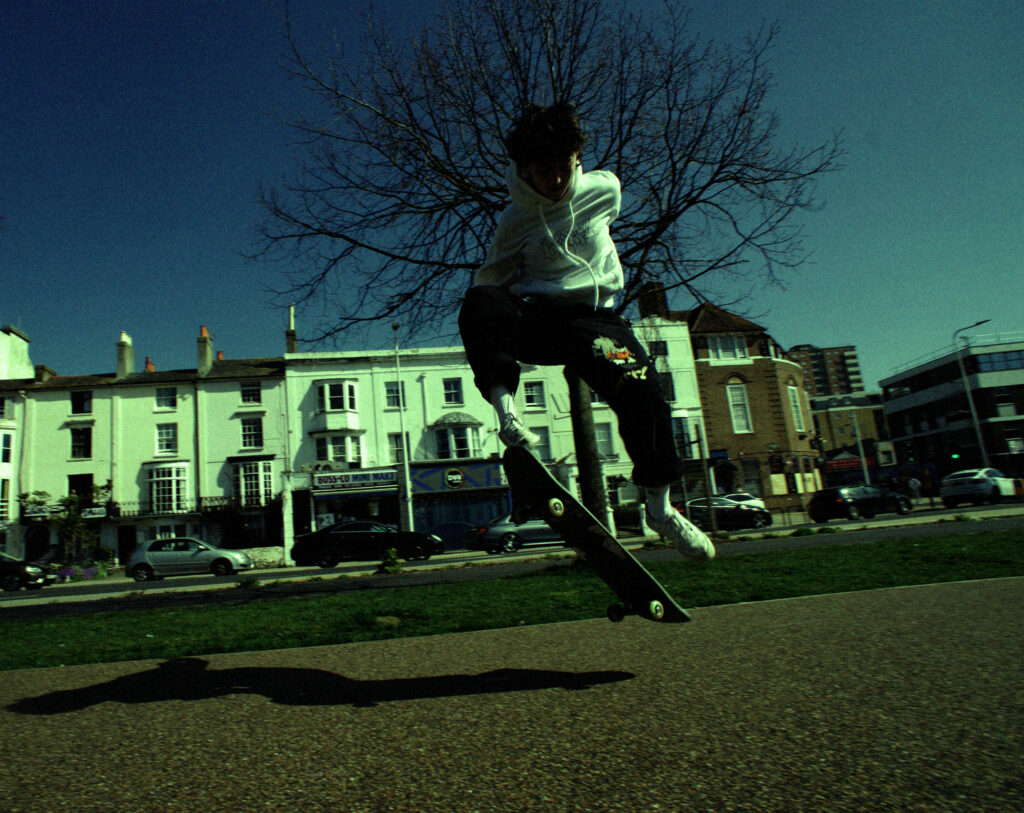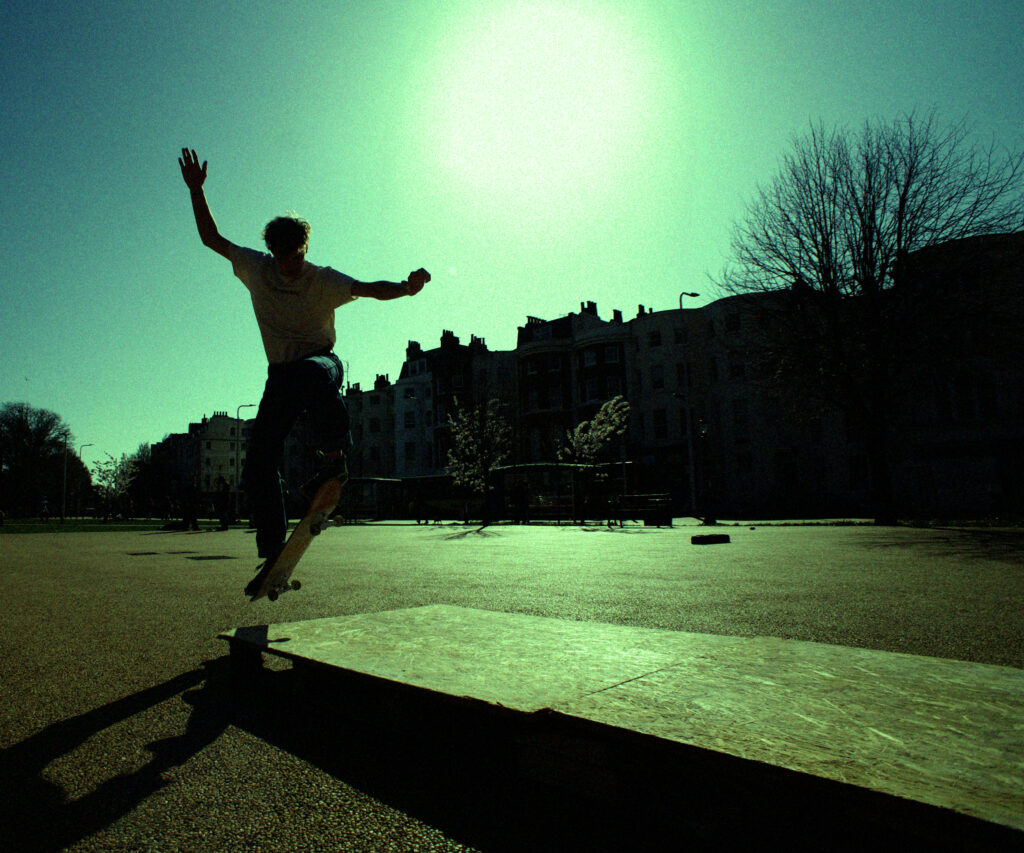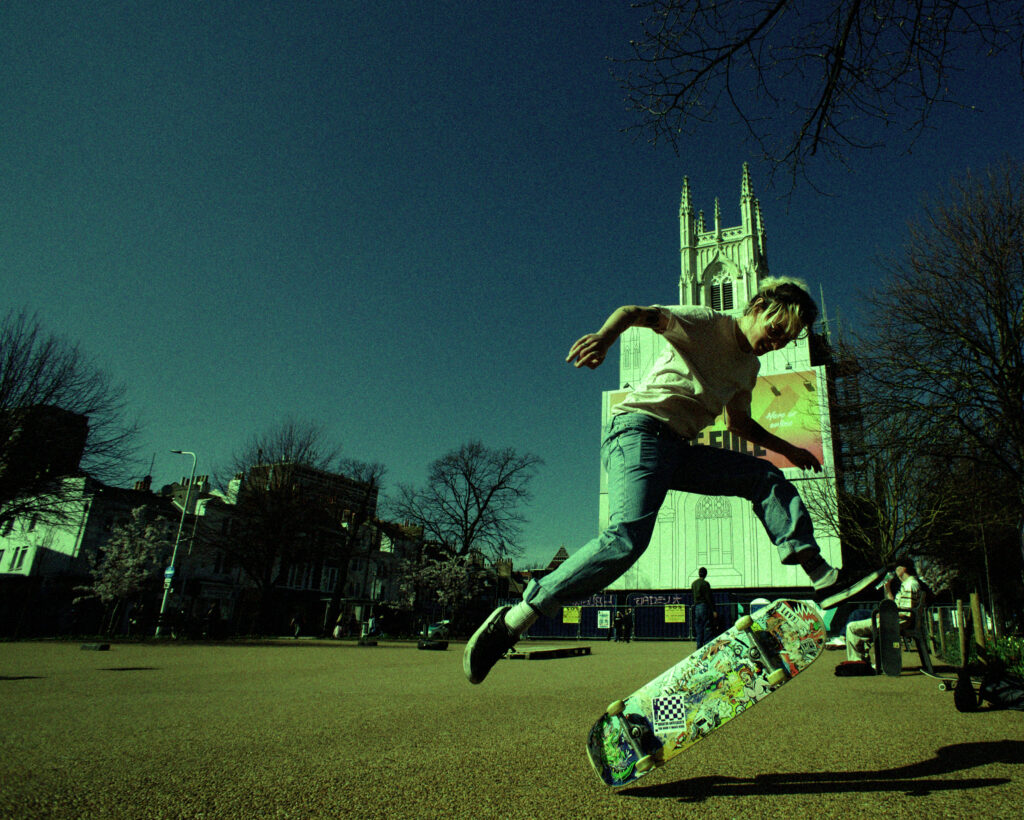As a farewell to this section, I wanted to dedicate the last instalment of Artist Focus to a creative community in Brighton that is close to my heart: the Brighton Skate Collective. When I moved to Brighton, I barely knew anyone. With a pandemic in full blast, and a Master’s degree to finish, I was pretty sure that my social life would be pretty non-existent. However, in a whim of boredom, I decided to take up skateboarding, and through that, I became part of the Brighton Skate Collective. Growing up with skateboard-obsessed cousins, I had been meaning to learn to skate since I was a kid. I remember being annoyed at Vans for not having shoes on my size, and watching Avril Lavigne’s videos obsessively on MTV, frustrated that I couldn’t be like her. The reason I never learnt as a kid is simple: I was a girl. I was told by my family that I could injure myself. They didn’t care about my cousins injuring themselves, but injuries became frightening as soon as a female-skin was involved.
After finding the BSC, I was suddenly made aware that I wasn’t the only woman with a similar experience. The skate community is still male-dominated, so often, girls start skating later on in life. It’s not that skater girls are not good enough, it’s that as women, we’re not taught to take up space, and skating is about constantly taking over the urban space. Through the BSC not only have I made friends, but I have also learnt to love my bruised legs, and to own the city as if it was ours, because it should be. In this article, I spoke to Weezy and Annie, the creators of the BSC. We spoke about their experience with skateboarding, how the collective came about, and the ways in which skateboarding can be considered a performance-based art form.
Tell me a bit about yourself and how you got into skating.
Weezy: I started skating when I was ten. I used to longboard and cruise, and I wanted to get involved with skateboarding at parks, but I didn’t have any mates who skated, and I was too scared to go on my own. Eventually, I found the girl skate nights in London. They have one every month in different skateparks, one of them is funded by Vans and the other one by Nike. They are really good fun, you go, get a few drinks, and meet all these girls who are skating. One of the girls there approached me and told me that they had a group chat for all the girl skaters in London, and she added me. That’s how I started meeting people, and that is also how I got the idea for the Brighton Skate Collective.
Annie: I was the same in terms of always wanting to skate. I’d see the boys skating when I was young, but I didn’t want to go on my own, and I just didn’t know any other girls who wanted to go with me. It was until I was sixteen that I found a group of girls who wanted to come skate with me. We went to the BYC girl’s night, because we were still too scared to go out by ourselves, even as a group of three. I stopped skating for a few years because of health issues, but after getting better, I turned to one of those nights by myself, and met Weezy there.

Could you give me a brief description of the Brighton Skate Collective? How did the idea emerge?
W: The BSC is a safe space; a group for people to come and have a go at skating, regardless of their skill set. It’s also just a place to meet like-minded people. I think it’s been especially nice after lockdown, because a lot of people haven’t met anyone for a long time. Some people come along and don’t skate that much, but it’s really an opportunity to be in a group of people that you feel comfortable with. That’s really the aim, and also, to make everyone great skaters!
A: People come to skate, but they stay because of how nice the social environment is. It’s a great space to meet new people, but it’s also very inclusive. We try to be open for any women or Queer people that might feel intimidated to turn up to a skatepark by themselves.
Would you say there is a sense of art-based performance in skateboarding?
W: I do. A lot of people don’t even realise it but skating is definitely a performance-based sport. You can see it with all the guys who are really good skaters; they are performing for each other by doing all these tricks. It’s all about who can make the best line, or who can connect the tricks in a different way. So, it’s a type of creative art form. It’s like dancing, but with a skateboard. You’re always choreographing your moves.
It seems to me that skateboarding culture is intrinsically connected to creativity, how do you think that plays into the BSC?
W: There’s so many people who are artists within the skate scene. What we found with the BSC is that there’s a lot of people doing film, photography, illustration, and so many creative things. So, it’s really nice that we have connected through skating, but then we can also create amazing things together. We’re actually working on a BSC zine at the moment.
A: If you think about the essence of what skateboarding is, specially things like street skating, it’s all about creating. You have this really simple tool, and you need to ask yourself: “what can I do with this?” If you think about all the tricks there are, someone had to think them initially. Someone had to choreograph them, and that is an artistic endeavour in itself.
W: When I see people doing really hard tricks, that’s impressive, but I find it more fun when people are just creative. Even if they can’t do much, I love it when they are adapting their skillset and interacting with whatever is around them.
A: Yeah, you also start skating on things that weren’t meant to be skated on. Ledges, steps, and all of that.
W: It makes you see your city in a completely different way. You start walking around and start thinking “oh my God, I could skate that!”, and you would have never noticed it before. Even if it is like a little ledge, you just think, “oh, if I had my board, I could do this!”.
A: I guess it’s the same kind of process as taking photos, or dancing, you adapt the city to the creative needs of what you’re doing.

How has skateboarding helped you with your self-expression?
W: It has connected me with people who are like-minded, which has allowed me to feel more comfortable to express myself in the way I want to. When you belong to a community where you feel completely accepted and included, you are more comfortable with exploring your self-expression.
A: A big part of the skateboarding culture has to do with fashion too. People dress in ways that are quite alternative, and people are encouraged to explore their style.
W: People really love to stand out in skater culture, and how you do it is up to you. It’s a very non-judgemental space.
How would you describe the skateboarding community in Brighton?
W: It’s tricky because we mainly surround ourselves with all the BSC people, so I can’t speak for the whole skate community in Brighton. However, I think the Level can be a bit hostile. Some of the guys in there have reached out to me, and told me that I’m welcome to join them, but then once you’re there, they are all zooming about and they don’t really remember what it’s like to be a beginner.
A: There’s the skate community, and then there’s our skate community, because we’re like a sub-community within Brighton. In general, there’s a thriving skate culture in Brighton, which is great, but it also means that the parks can be overwhelming and intimidating for people who are just starting. Our little community of girls and Queer people that skate is just wonderful, and it has made such a difference to me.
W: I think the vibe that we have at St. Peter’s is great now. You got the roller skaters, and the skaters, and there’s lots of space for beginners. Someone said to me that Brighton has the highest number of girl skaters, I don’t know where they got that fact from, or if it’s true, but it would be nice if it was.

Do you have any favourite skaters? Why are they your favourites?
W: There’s a skater called tubsy (@unafarrar) she makes really cool videos, and I really like her edits, and she’s really good at skating too. At the moment I really like Maité (@clubmaiteee), she’s really cool, she’s good at skating and she also seems good fun.
Ideally, where do you see the collective in a year’s time?
W: I’m not sure. We didn’t even think we would get to where we are now. When me and Annie set it up, we didn’t think anyone would come, and then in the first meet there were about five or six people, and that was so many to us. And now there’s like a hundred people in the WhatsApp group chat. I just hope the collective keeps growing and that our vibe stays the same, open and welcoming. We’re also working on a zine, which I would love to get out at some point, and to get some video edits of us skating.
A: I think big things will happen. We always get excited about ideas, and we know some of them will happen and some of them won’t, but I think things like skate holidays, once lockdown is over, will definitely be on the books. It would be nice to have a consistent group every week with maybe over thirty people. Imagine turning up to the Level with thirty girls, and all the guys just not even knowing what’s hit them.
W: We want to take over Brighton!
Contributions by Weezy (@weezyy_) and Annie (@a.sherred).
You can follow the Brighton Skate Collective on Instagram: @brightonskatecollective

